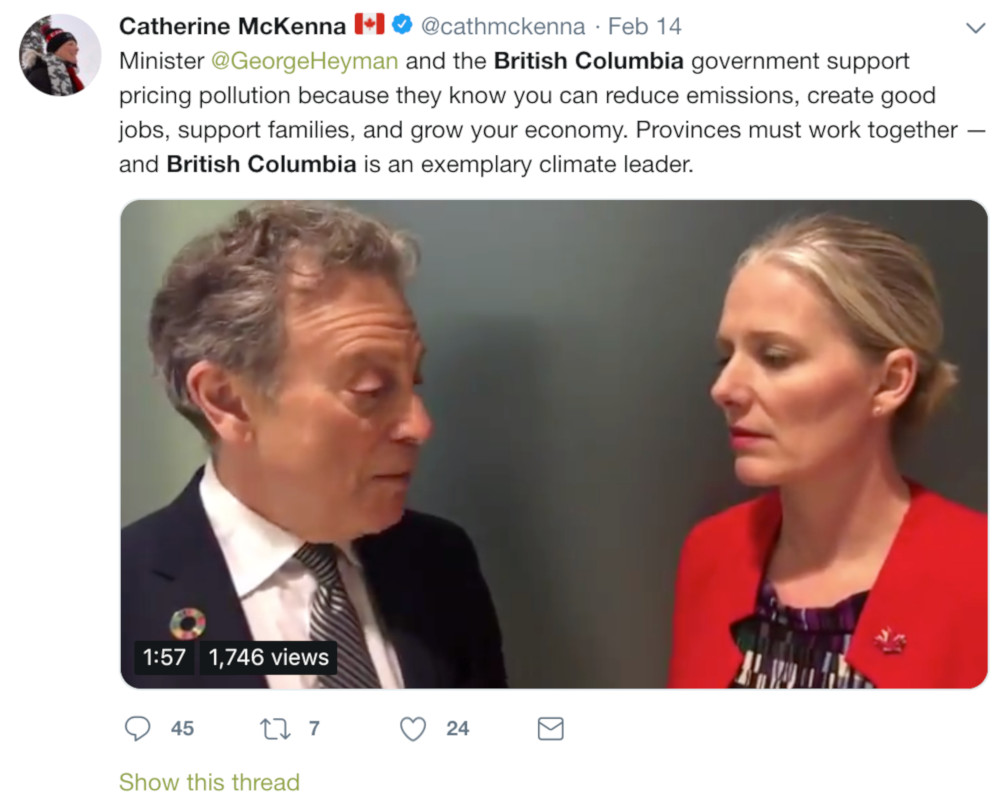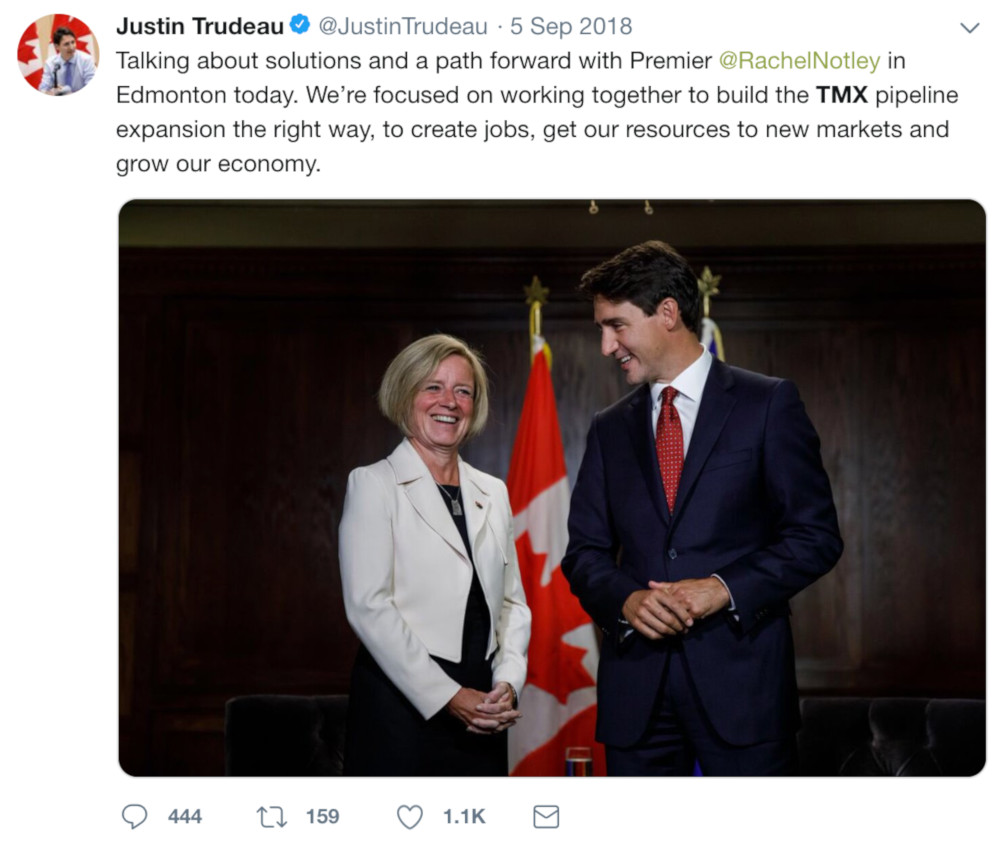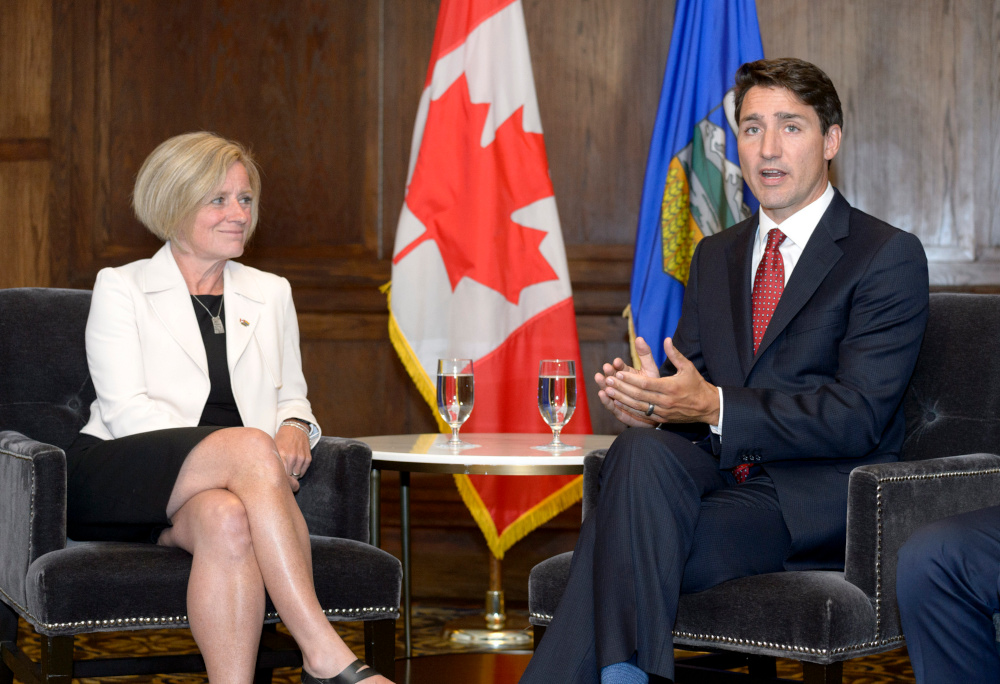The federal government’s treatment of British Columbia shows the Trudeau Liberals’ “incoherence” on climate change, says an environmental campaigner.
On one hand, Environment Minister Catherine McKenna is calling B.C. an “exemplary climate leader” on Twitter, because the provincial government supports its carbon tax.

At the same time, the Trudeau government is fighting to force the Trans Mountain pipeline expansion through B.C. over the provincial government’s objections and accusing B.C. of hurting the country’s economy.

As a result, B.C. is involved in three court cases concerning environmental issues that involve the federal government.
In two, the province is intervening in support of the federal government to argue in favour of a national carbon tax.
In the third, B.C. is asking if it has the right to control what hazardous materials come across its borders, which could give it the ability to block the Trans Mountain pipeline expansion.
The conflicting legal cases show a basic problem with the federal government’s climate change policies, Dogwood BC campaigner Sophie Harrison told The Tyee.
“It speaks to the fundamental incoherence in the federal government’s climate change policies,” she said. “Out of one side of their mouth they are talking about leading on climate, they are talking about making polluters pay for climate damages... and out of the other side of their mouth they pay oil companies to pollute. And they do this with subsidies and tax breaks.”
The federal Greenhouse Gas Pollution Pricing Act comes into effect Monday.
The tax will start at $10 per tonne of carbon emissions, gradually rising to $50.
People and industries that already have a carbon tax in place — like B.C. — won’t see any impact.
Saskatchewan and Ontario are fighting the carbon tax and challenging its constitutional legitimacy in court.
Saskatchewan argued in the province’s appeal court in February that dealing with carbon emissions is a provincial responsibility, and the federal government does not have the right to tax provincial Crown corporations SaskPower and SaskEnergy, which would be affected.
Ontario’s similar challenge will be heard in the province’s appeal court in April.
In both cases the federal government is arguing greenhouse gases are a national concern and fall under its jurisdiction, according to court documents.
B.C., which adopted a carbon tax in 2008, has been cited as an international example of how a developed economy can grow while at the same time reducing carbon emissions.
In a court document prepared for the Ontario case, Tim Lesiuk of the B.C. government’s Climate Action Secretariat argued the lack of a national carbon tax has allowed pollution to flow freely from other provinces to harm British Columbians — citing rising sea levels, fiercer fire seasons, melting permafrost and ocean acidification, among other concerns.
The David Suzuki Foundation, represented by Ecojustice, is also intervening in support of Ottawa in the two cases, arguing the federal government has the right to set a federal carbon price because climate change is a national emergency.
B.C. and the federal government agree in the carbon tax cases — action or inaction in one jurisdiction affects other provinces.
But in the Trans Mountain expansion court case, the federal government is opposing B.C.’s argument that it has the right to regulate the flow of potentially harmful substances through the province — in this case in a pipeline.
B.C. is asking the Court of Appeal to rule on whether it has the right to amend the Environmental Management Act to control oil or bitumen shipments in the province and whether the federal government could override that law.
The proposed amendments would require companies transporting hazardous materials through B.C. to gain permits first.
But federal lawyers argued the changes were unconstitutional, because the federal government has jurisdiction over interprovincial infrastructure.
Ecojustice lawyer Kegan Pepper-Smith told media outside the courthouse March 18 the province has the right to act if it sees gaps in federal protection.
The court has reserved its decision on the province’s application.
The National Energy Board released its second review of the Trans Mountain pipeline expansion in February where it found the project could have “significant adverse environmental effects.” But it recommended the federal government approve the project in the name of Canada’s public interest. ![]()
Read more: Energy, Federal Politics, Environment
















Tyee Commenting Guidelines
Comments that violate guidelines risk being deleted, and violations may result in a temporary or permanent user ban. Maintain the spirit of good conversation to stay in the discussion.
*Please note The Tyee is not a forum for spreading misinformation about COVID-19, denying its existence or minimizing its risk to public health.
Do:
Do not: